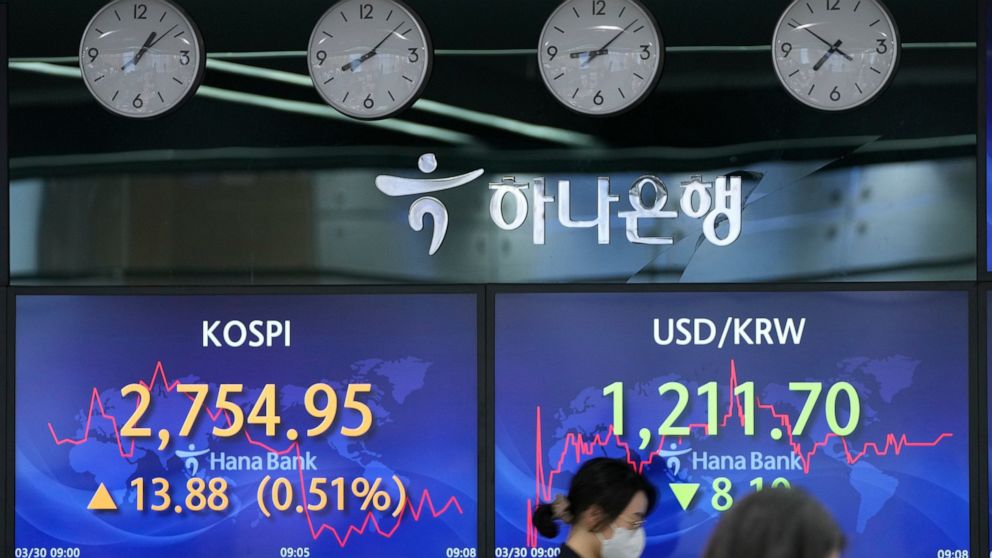Stocks fall, breaking a 4-day winning streak on Wall Street
Stocks ended lower on Wall Street Wednesday, breaking a four-day winning streak but keeping major indexes in the green so far for the week
NEW YORK — Stocks ended lower on Wall Street Wednesday, breaking a four-day winning streak but keeping major indexes in the green so far for the week. The S&P 500 fell 0.6% and the Dow Jones Industrial Average slipped 0.2%. The Nasdaq fell 1.2% as technology stocks fell more than the rest of the market. Energy stocks rose along with oil prices. Markets have been rising this week as talks between Russia and Ukraine seemed to show progress, but the prospects for ending the war in Ukraine remain highly uncertain. Treasury yields fell. The yield on the 10-year Treasury note fell to 2.35%.
THIS IS A BREAKING NEWS UPDATE. AP’s earlier story follows below.
Technology companies helped pull stocks lower on Wall Street in afternoon trading Wednesday, placing the market on pace to end a four-day winning streak.
The S&P 500 fell 0.6% as of 1:58 p.m. Eastern. The Dow Jones Industrial Average fell 126 points, or 0.4%, to 35,165 and the Nasdaq fell 0.8%.
Markets have been rising this week as talks between Russia and Ukraine seemed to show progress and following encouraging data on consumer confidence.
Negotiations between Russia and Ukraine remain uncertain, however, and Russian shelling in areas where it had said it would pull back tempered optimism about prospects for a resolution to the conflict.
On Wednesday, an adviser to Ukraine’s president said that a vote sealing a prospective agreement with Russia could only be held after Russian troops pull back. Investors were also hit with potentially discouraging update on economic growth.
The Commerce Department said the U.S. economy grew at an annual pace of 6.9% from October through December. That was slower than previous estimates and fell short of economists expectations.
Technology stocks were among the biggest weights on the broader market. Many of the companies in the sector have pricey values that tend to push the broader market in either direction. Chipmaker Nvidia fell 2.7%.
Retailers also fell and weighed down the market. Home Depot slipped 3.2%.
Oil prices, which have been volatile since Russia invaded Ukraine in February, gained ground. U.S. benchmark crude oil rose 2.6% and Brent crude, the international standard, rose 2.9%.
Energy stocks gained ground along with rising oil prices. Phillips 66 rose 3.5%.
European markets were mostly lower while Asian stocks rose.
Bond yields fell. The yield on the 10-year Treasury note, which influences interest rates on mortgages and other consumer loans, slipped to 2.37% from 2.40% late Tuesday.
Bond yields have been mostly rising this year as Wall Street prepares for a shift in policy from the Federal Reserve. The central bank, along with its global counterparts, is raising benchmark interest rates to help fight persistently rising inflation.
Wall Street is also closely watching the bond market for clues about the economy’s path. On Tuesday, the yield for 10-year Treasury briefly dropped below the 2-year Treasury’s yield, what Wall Street calls an “inversion” of the Treasury yield curve. Investors take note of this because prolonged yield inversions have accurately predicted previous U.S. recessions. The 2-year Treasury yield fell to 2.33% from 2.35% late Tuesday.
Investors have several more economic updates to review this week. On Thursday, the Commerce Department will release its personal income and spending report for February and the Labor Department on Friday will release is employment report for March.
Wall Street is also preparing for the latest round of corporate report cards as the quarter comes to a close. Several companies have already released financial results and updates.
Athletic apparel maker Lululemon jumped 11.7% after reporting encouraging financial results for its most recent quarter and giving a strong sales forecast. Online pet store Chewy slumped 15.9% after reporting a fiscal fourth-quarter loss that was steeper than analysts expected.
![]()


